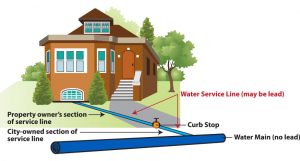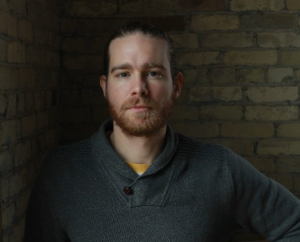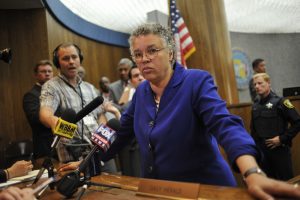
With confidence in drinking water lost for many, a new opportunity
Has a realization that Flint’s drinking water problems are not confined to Flint finally registered with politicians in the Great Lakes region? Or are they worried that a 2014 Toledo-style water crisis fueled by agriculture pollution could happen again?
A new crop of politicians in the region is emerging, putting a spotlight on long-entrenched drinking water quality issues.
For example:
- In Wisconsin, new Gov. Tony Evers said in his State of the State speech that “7 million Wisconsinites depend on private wells for water, and 47 percent of these wells do not meet acceptable health standards.” Evers declared 2019 the “Year of Drinking Water Quality” in Wisconsin.
- In Chicago, a leading candidate for mayor announced a plan to replace the city’s 385,000 lead service lines. Candidate Toni Preckwinkle pitched her plan as an environmental justice initiative and said she’ll give priority to begin the replacement to areas of the city with dense populations of children.
Service lines run from the main line to the property owner’s home and are the responsibility of the homeowner.
While proclamations and campaign pledges make headlines, none of the drinking water issues has an easy fix. If they did they wouldn’t be lingering issues.
“We have a great opportunity in the region, with new leadership in many of the Great Lake state executive offices, to address the drinking water crisis in our region,” said Todd Ambs, who this week was named Wisconsin’s assistant deputy secretary of the Department of Natural Resources.
He had previous roles as director of the Healing Our Waters Great Lakes Coalition. and managing the water division of the DNR.
“Literally thousands of people in the Great Lakes basin are no longer confident that they can turn on their taps and safely drink the water,” Ambs said. “We are now nearly two decades into the 21st century and that is simply unacceptable and must get fixed.”
Court to decide on manure runoff
In Wisconsin, a leading source of contaminated wells is manure runoff from large farming operations known as Concentrated Animal Feeding Operations (CAFOs) that can house thousands of animals.
“Too many people who rely on private wells for their drinking water have had to struggle with unsafe water coming from their taps due in part to manure spreading,” said Evan Feinauer, a Clean Wisconsin staff attorney on the group’s website.
Clean Wisconsin praised Gov. Evers for his drinking water proclamation but said a pending Wisconsin Supreme Court case will decide if tighter regulation of runoff from CAFOs can be implemented.
The issue is whether Wisconsin’s Department of Natural Resources has the authority to limit the number of animals on CAFOs.
Lower courts have ruled that the DNR has the authority to set farm size limits. The DNR claims it doesn’t have that regulatory authority and granted permits that Clean Wisconsin and others are contesting.
“The Wisconsin Supreme Court now has the future of our water management in their hands,” said Feinauer. The court decision is expected later this year.
Mayoral candidate: Chicago didn’t learn from Flint
Chicago mayoral candidate Preckwinkle recently made replacing lead service lines an issue in the upcoming Chicago mayoral election.
She said that after the Flint drinking water crisis received national attention, Chicago “failed to aggressively test for lead in homes’ drinking water” and did little to educate homeowners about the problem.
If elected, Chicago will join Detroit, New York and 49 other cities with goals and plans for lead service line replacements, according to her campaign website. She says she’ll pursue federal and state funding and leverage public private partnerships for additional funding.
“Chicago stays at the forefront of water quality efforts” the Department of Water Management said in a December 2018 press release updating residents on the lead service line issue. The department cited a significant reduction in elevated blood levels with lead in children over the past twenty years.
But the scope of Chicago’s lead pipe issues is daunting with an estimated 385,000 service lines in need of replacement according to Preckwinkle. And her plan relies on federal and state funding which may not materialize.
Preckwinkle is currently president of the Cook County Board and has a substantial lead over a large field of candidates in recent polling. Incumbent Mayor Rahm Emanuel is not running for re-election and will leave office in May.
New governors in Michigan and Ohio also face drinking water concerns. Michigan has a significant PFAS contamination issue, and Ohio has made little progress in reigning in farm pollution that contributed to the 2014 Toledo water crisis.
Editor’s note: Post deadline, the Wisconsin DNR announced that Todd Ambs has been appointed DNR Assistant Deputy Secretary. DNR Secretary Cole announces additional appointments to leadership team







